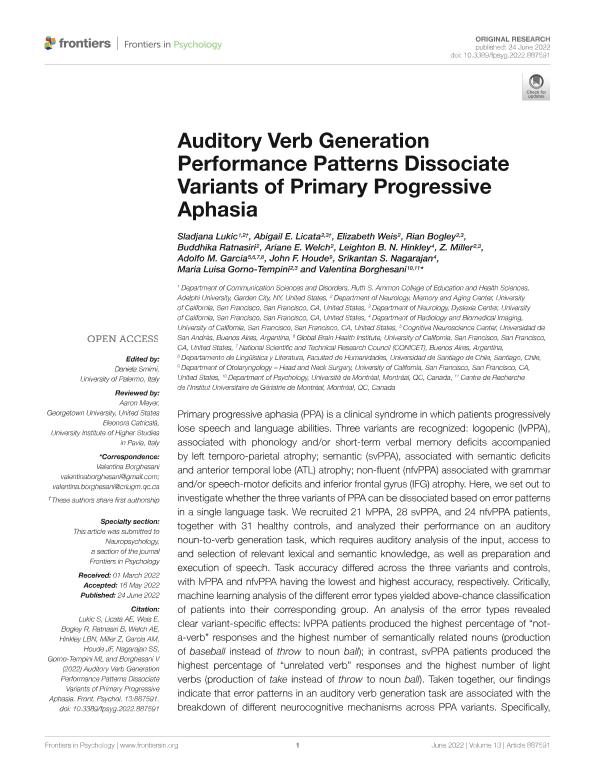Mostrar el registro sencillo del ítem
dc.contributor.author
Lukic, Sladjana
dc.contributor.author
Licata, Abigail E.
dc.contributor.author
Weis, Elizabeth
dc.contributor.author
Bogley, Rian
dc.contributor.author
Ratnasiri, Buddhika
dc.contributor.author
Welch, Ariane E.
dc.contributor.author
Hinkley, Leighton B. N.
dc.contributor.author
Miller, Z.
dc.contributor.author
García, Adolfo Martín

dc.contributor.author
Houde, John F.
dc.contributor.author
Nagarajan, Srikantan S.
dc.contributor.author
Gorno Tempini, Maria Luisa
dc.contributor.author
Borghesani, Valentina
dc.date.available
2023-06-23T14:51:23Z
dc.date.issued
2022-06
dc.identifier.citation
Lukic, Sladjana; Licata, Abigail E.; Weis, Elizabeth; Bogley, Rian; Ratnasiri, Buddhika; et al.; Auditory Verb Generation Performance Patterns Dissociate Variants of Primary Progressive Aphasia; Frontiers Media; Frontiers in Psychology; 13; 6-2022; 1-13
dc.identifier.issn
1664-1078
dc.identifier.uri
http://hdl.handle.net/11336/201288
dc.description.abstract
Primary progressive aphasia (PPA) is a clinical syndrome in which patients progressively lose speech and language abilities. Three variants are recognized: logopenic (lvPPA), associated with phonology and/or short-term verbal memory deficits accompanied by left temporo-parietal atrophy; semantic (svPPA), associated with semantic deficits and anterior temporal lobe (ATL) atrophy; non-fluent (nfvPPA) associated with grammar and/or speech-motor deficits and inferior frontal gyrus (IFG) atrophy. Here, we set out to investigate whether the three variants of PPA can be dissociated based on error patterns in a single language task. We recruited 21 lvPPA, 28 svPPA, and 24 nfvPPA patients, together with 31 healthy controls, and analyzed their performance on an auditory noun-to-verb generation task, which requires auditory analysis of the input, access to and selection of relevant lexical and semantic knowledge, as well as preparation and execution of speech. Task accuracy differed across the three variants and controls, with lvPPA and nfvPPA having the lowest and highest accuracy, respectively. Critically, machine learning analysis of the different error types yielded above-chance classification of patients into their corresponding group. An analysis of the error types revealed clear variant-specific effects: lvPPA patients produced the highest percentage of “not-a-verb” responses and the highest number of semantically related nouns (production of baseball instead of throw to noun ball); in contrast, svPPA patients produced the highest percentage of “unrelated verb” responses and the highest number of light verbs (production of take instead of throw to noun ball). Taken together, our findings indicate that error patterns in an auditory verb generation task are associated with the breakdown of different neurocognitive mechanisms across PPA variants. Specifically, they corroborate the link between temporo-parietal regions with lexical processing, as well as ATL with semantic processes. These findings illustrate how the analysis of pattern of responses can help PPA phenotyping and heighten diagnostic sensitivity, while providing insights on the neural correlates of different components of language.
dc.format
application/pdf
dc.language.iso
eng
dc.publisher
Frontiers Media

dc.rights
info:eu-repo/semantics/openAccess
dc.rights.uri
https://creativecommons.org/licenses/by-nc-sa/2.5/ar/
dc.subject
AUDITORY VERB GENERATION
dc.subject
ERRORS ANALYSIS
dc.subject
LEXICAL PROCESSING
dc.subject
PRIMARY PROGRESSIVE APHASIA
dc.subject
SEMANTIC PROCESSING
dc.subject.classification
Lingüística

dc.subject.classification
Lengua y Literatura

dc.subject.classification
HUMANIDADES

dc.subject.classification
Psicología

dc.subject.classification
Psicología

dc.subject.classification
CIENCIAS SOCIALES

dc.title
Auditory Verb Generation Performance Patterns Dissociate Variants of Primary Progressive Aphasia
dc.type
info:eu-repo/semantics/article
dc.type
info:ar-repo/semantics/artículo
dc.type
info:eu-repo/semantics/publishedVersion
dc.date.updated
2023-06-21T10:48:39Z
dc.journal.volume
13
dc.journal.pagination
1-13
dc.journal.pais
Suiza

dc.description.fil
Fil: Lukic, Sladjana. University of California; Estados Unidos
dc.description.fil
Fil: Licata, Abigail E.. University of California; Estados Unidos
dc.description.fil
Fil: Weis, Elizabeth. University of California; Estados Unidos
dc.description.fil
Fil: Bogley, Rian. University of California; Estados Unidos
dc.description.fil
Fil: Ratnasiri, Buddhika. University of California; Estados Unidos
dc.description.fil
Fil: Welch, Ariane E.. University of California; Estados Unidos
dc.description.fil
Fil: Hinkley, Leighton B. N.. University of California; Estados Unidos
dc.description.fil
Fil: Miller, Z.. University of California; Estados Unidos
dc.description.fil
Fil: García, Adolfo Martín. Universidad de San Andrés; Argentina. Consejo Nacional de Investigaciones Científicas y Técnicas; Argentina. Universidad Nacional de Cuyo. Facultad de Educación Elemental y Especial; Argentina
dc.description.fil
Fil: Houde, John F.. University of California; Estados Unidos
dc.description.fil
Fil: Nagarajan, Srikantan S.. University of California; Estados Unidos
dc.description.fil
Fil: Gorno Tempini, Maria Luisa. University of California; Estados Unidos
dc.description.fil
Fil: Borghesani, Valentina. University of Montreal; Canadá
dc.journal.title
Frontiers in Psychology
dc.relation.alternativeid
info:eu-repo/semantics/altIdentifier/url/https://www.frontiersin.org/articles/10.3389/fpsyg.2022.887591/full
dc.relation.alternativeid
info:eu-repo/semantics/altIdentifier/doi/https://doi.org/10.3389/fpsyg.2022.887591
Archivos asociados
